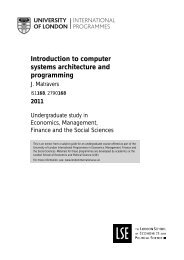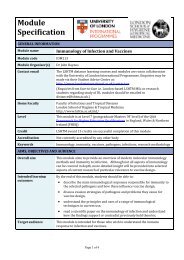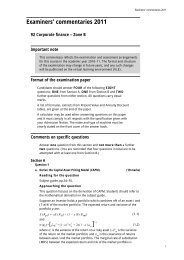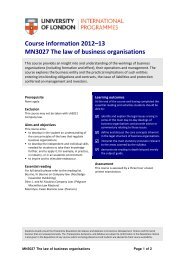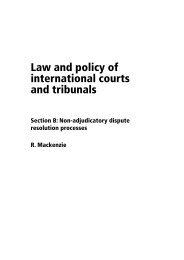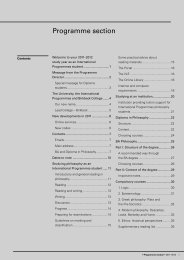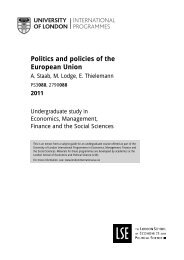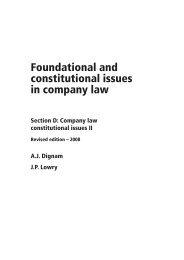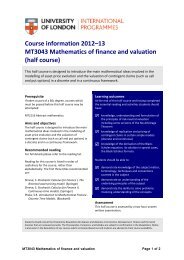Principles of sociology - University of London International ...
Principles of sociology - University of London International ...
Principles of sociology - University of London International ...
Create successful ePaper yourself
Turn your PDF publications into a flip-book with our unique Google optimized e-Paper software.
21 <strong>Principles</strong> <strong>of</strong> <strong>sociology</strong><br />
24<br />
If we were to dig a little deeper and do some research, we would find<br />
more evidence <strong>of</strong> the regularities <strong>of</strong> social life.<br />
For example:<br />
• economic data show that the patterns <strong>of</strong> employment, output, imports<br />
and exports <strong>of</strong> a country are very similar from one year to the next<br />
• demographic data – that is, information about the distribution <strong>of</strong><br />
populations – show that in any given country roughly the same number<br />
<strong>of</strong> people are born each year, get married and get divorced<br />
• rule breaking – reported crimes, arrests, rates <strong>of</strong> mental illness and<br />
even suicide rates are much the same year in and year out<br />
• social differences – there are significant and consistent variations<br />
between different social groups in a society: for example, those from<br />
economically poorer social backgrounds – sometimes referred to in<br />
<strong>sociology</strong> as socially deprived or lower social class – are more likely, on<br />
average, to end up with lower educational qualifications, work in lowpaid<br />
jobs, have worse health and die at younger ages.<br />
Sociology is about documenting and explaining these kinds <strong>of</strong> regularities<br />
and patterns. So, whereas journalists, the mass media and to some extent<br />
the general public, are more interested in the unusual and troublesome,<br />
sociologists are more interested the usual, the everyday, the ‘taken-forgranted’.<br />
Origins <strong>of</strong> <strong>sociology</strong><br />
The formal study <strong>of</strong> <strong>sociology</strong> began in the nineteenth century as an<br />
attempt to make sense <strong>of</strong> massive changes that were sweeping over<br />
Western Europe at that time. European societies were industrialising<br />
and there was a mass movement <strong>of</strong> people from the rural to the urban<br />
areas. Traditional institutions <strong>of</strong> power and control, such as the Church<br />
and landed aristocracy, were losing much <strong>of</strong> their influence. The late<br />
eighteenth and nineteenth centuries were times <strong>of</strong> reform and revolution<br />
and new sources <strong>of</strong> power, such as the property-owning capitalist class<br />
and organised labour movements were beginning to emerge. The fact that<br />
societies could be transformed so dramatically in such a comparatively<br />
short space <strong>of</strong> time led scholars to start exploring the sources <strong>of</strong> social<br />
order and change, and the subject we now know as <strong>sociology</strong> was born.<br />
These early sociologists tried to make sense <strong>of</strong> this new industrial age<br />
by identifying what they believed were its essential characteristics and<br />
comparing them with what had gone before. We shall be looking at these<br />
theories in more detail in Chapter 4, but we can introduce two <strong>of</strong> the most<br />
influential figures here.<br />
For Karl Marx (1818–1883), whose ideas were later to transform the<br />
world, the modern age was characterised, above all, by a new form <strong>of</strong><br />
free market economy that he called industrial capitalism. Marx was<br />
very critical <strong>of</strong> capitalism. He argued that most <strong>of</strong> the wealth it created<br />
remained in the hands <strong>of</strong> the small owning class who made their pr<strong>of</strong>its by<br />
exploiting the labour power <strong>of</strong> the workers. However, capitalist societies<br />
were constantly changing, and Marx was optimistic that they were<br />
sowing the seeds <strong>of</strong> their own destruction. The injustices they produced,<br />
and people’s increasing awareness <strong>of</strong> them, would lead to revolutionary<br />
change and the creation <strong>of</strong> what Marx believed would be fairer communist<br />
societies where resources would be distributed to people according to their<br />
needs. See the section on Karl Marx in Chapter 4 for further reading.



